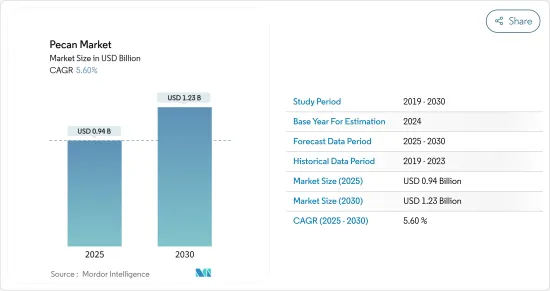PUBLISHER: Mordor Intelligence | PRODUCT CODE: 1690120

PUBLISHER: Mordor Intelligence | PRODUCT CODE: 1690120
Pecan - Market Share Analysis, Industry Trends & Statistics, Growth Forecasts (2025 - 2030)
The Pecan Market size is estimated at USD 0.94 billion in 2025, and is expected to reach USD 1.23 billion by 2030, at a CAGR of 5.60% during the forecast period (2025-2030).

The global pecan market is experiencing significant expansion due to increasing health awareness and consumer preference for nutritious food choices. According to the International Nut & Dried Fruit Council, pecans represented 3% of global tree nut production in the 2022-2023 crop year. Pecans are nutrient-dense foods, containing substantial amounts of vitamin C, niacin, vitamin B-6, and essential minerals such as calcium, copper, iron, magnesium, manganese, phosphorus, and zinc. The market growth is further strengthened by the substantial increase in per capita expenditure on vegan food products across regions.
The United States and Mexico maintain their position as dominant pecan producers, collectively contributing over 45% of the global output. The United States also maintains its status as a primary consumer market for pecans, primarily driven by their extensive incorporation into traditional American cuisine and baked goods. However, unpredictable and severe weather conditions continue to pose significant challenges to market growth. In 2023, persistent strong winds and prolonged inadequate rainfall patterns in the United States caused substantial yield losses in major pecan-growing regions, resulting in sharp price increases both in domestic markets and international trade channels.
Pecan Market Trends
Increased Awareness About Health Benefits Associated With Pecan Consumption
The pecan, a tree nut native to North America, is rich in essential minerals including calcium, magnesium, and potassium, which collectively contribute to blood pressure regulation and overall cardiovascular health. The growing demand for plant-based food products has significantly increased the popularity of pecan-based products among health-conscious consumers who seek natural, nutrient-dense alternatives. Additionally, the rising prevalence of allergies and intolerances to common ingredients like lactose and gluten has led individuals to turn to pecans as a versatile nutritional alternative. To meet this increasing demand, pecan production has substantially expanded across growing regions. According to the International Nut & Dried Fruit Council, pecan production reached 154.6 thousand metric tons in 2023, representing a 9% increase from the previous year, indicating robust market growth.
Food and supplement manufacturers are increasingly incorporating pecans into dietary supplements specifically formulated to support healthy cholesterol levels, cardiovascular health, weight management, and digestive function. In 2023, Aloha demonstrated this trend by introducing a limited-edition Chocolate Caramel Pecan protein bar. This innovative product combines organic dark chocolate with a proprietary blend of brown rice and pumpkin seed protein, featuring premium organic pecans to enhance both nutritional value and taste profile.
United States Dominates the Market
The United States dominates global pecan production and consumption, with its favorable climate conditions and advanced agricultural practices supporting extensive cultivation. According to the International Nut & Dryfruit Council, the country produced 62.3 thousand metric tons of pecans in the crop year 2023-2024, representing 43% of global tree nut production. Pecan consumption is highest in states like California, Florida, New York, Texas, and New Jersey, where consumers incorporate these nuts into various culinary applications and snacking habits. Increasing health consciousness among consumers drives pecan consumption in the country, particularly due to their high antioxidant content and heart-healthy properties.
The rising popularity of plant-based diets has prompted companies to introduce processed pecan products, including milk and cheese spreads, targeting vegetarian, vegan, and lactose-intolerant consumers who seek nutritious alternatives to dairy products. In 2024, the Pecan company introduced two pecan milk varieties in the United States, responding to this growing market demand. Pecans are extensively used in manufacturing snacks, chocolate bars, biscuits, and other food products, with food manufacturers valuing their distinct flavor profile and nutritional benefits. The expanding use of pecans in the food and beverage industry is expected to increase consumption in the coming years, driven by product innovation and changing consumer preferences.
Additional Benefits:
- The market estimate (ME) sheet in Excel format
- 3 months of analyst support
TABLE OF CONTENTS
1 INTRODUCTION
- 1.1 Study Assumptions and Market Definition
- 1.2 Scope of the Study
2 RESEARCH METHODOLOGY
3 EXECUTIVE SUMMARY
4 MARKET DYNAMICS
- 4.1 Market Overview
- 4.2 Market Drivers
- 4.2.1 Increased Awareness About Health Benefits Associated With Pecan Consumption
- 4.2.2 Increased Use in Processed Foods
- 4.2.3 Rising Adoption of Plant Based Diets
- 4.3 Market Restraints
- 4.3.1 Volatility in the Prices
- 4.3.2 Adverse Weather Conditions Affecting Yield
- 4.4 Value Chain Analysis
5 MARKET SEGMENTATION
- 5.1 Geography (Production Analysis, Consumption Analysis by Value and Volume, Import Market Analysis by Value and Volume, Export Market Analysis by Value and Volume, and Price Trend Analysis)
- 5.1.1 United States
- 5.1.2 Canada
- 5.1.3 Mexico
- 5.1.4 Germany
- 5.1.5 Netherlands
- 5.1.6 United Kingdom
- 5.1.7 France
- 5.1.8 Israel
- 5.1.9 China
- 5.1.10 Japan
- 5.1.11 Australia
- 5.1.12 Brazil
- 5.1.13 Argentina
- 5.1.14 South Africa
6 MARKET OPPORTUNITIES AND FUTURE TRENDS




